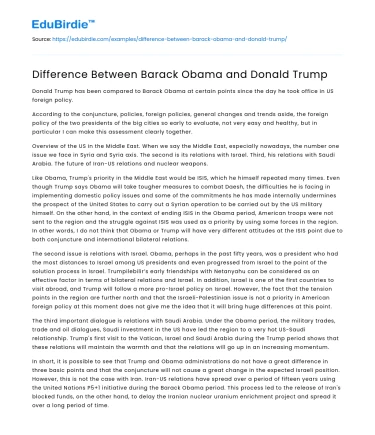Donald Trump has been compared to Barack Obama at certain points since the day he took office in US foreign policy.
According to the conjuncture, policies, foreign policies, general changes and trends aside, the foreign policy of the two presidents of the big cities so early to evaluate, not very easy and healthy, but in particular I can make this assessment clearly together.
Save your time!
We can take care of your essay
- Proper editing and formatting
- Free revision, title page, and bibliography
- Flexible prices and money-back guarantee
Overview of the US in the Middle East. When we say the Middle East, especially nowadays, the number one issue we face in Syria and Syria axis. The second is its relations with Israel. Third, his relations with Saudi Arabia. The future of Iran-US relations and nuclear weapons.
Like Obama, Trump's priority in the Middle East would be ISIS, which he himself repeated many times. Even though Trump says Obama will take tougher measures to combat Daesh, the difficulties he is facing in implementing domestic policy issues and some of the commitments he has made internally undermines the prospect of the United States to carry out a Syrian operation to be carried out by the US military himself. On the other hand, in the context of ending ISIS in the Obama period, American troops were not sent to the region and the struggle against ISIS was used as a priority by using some forces in the region. In other words, I do not think that Obama or Trump will have very different attitudes at the ISIS point due to both conjuncture and international bilateral relations.
The second issue is relations with Israel. Obama, perhaps in the past fifty years, was a president who had the most distances to Israel among US presidents and even progressed from Israel to the point of the solution process in Israel. Trumpilebilir’s early friendships with Netanyahu can be considered as an effective factor in terms of bilateral relations and Israel. In addition, Israel is one of the first countries to visit abroad, and Trump will follow a more pro-Israel policy on Israel. However, the fact that the tension points in the region are further north and that the Israeli-Palestinian issue is not a priority in American foreign policy at this moment does not give me the idea that it will bring huge differences at this point.
The third important dialogue is relations with Saudi Arabia. Under the Obama period, the military trades, trade and oil dialogues, Saudi investment in the US have led the region to a very hot US-Saudi relationship. Trump's first visit to the Vatican, Israel and Saudi Arabia during the Trump period shows that these relations will maintain the warmth and that the relations will go up in an increasing momentum.
In short, it is possible to see that Trump and Obama administrations do not have a great difference in three basic points and that the conjuncture will not cause a great change in the expected Israeli position. However, this is not the case with Iran. Iran-US relations have spread over a period of fifteen years using the United Nations P5+1 initiative during the Barack Obama period. This process led to the release of Iran's blocked funds, on the other hand, to delay the Iranian nuclear uranium enrichment project and spread it over a long period of time. However, the Trump administration is not really the case. Donald Trump, in his speech, talked about the Iranian approach he had made before hand and talked about tearing Obama's covenant in relations with Iran. Therefore, the clear and different perspective of Donald Trump in Iran is the most important and distinct approach to the Middle East when the Obama and Trump periods are evaluated in the US foreign policy.
Trump's problems in domestic politics, developments in Syria, but above all, the reality that military tensions with Iran will never be like Iraq or Syria, and it will become a much bigger and global event.






 Stuck on your essay?
Stuck on your essay?

